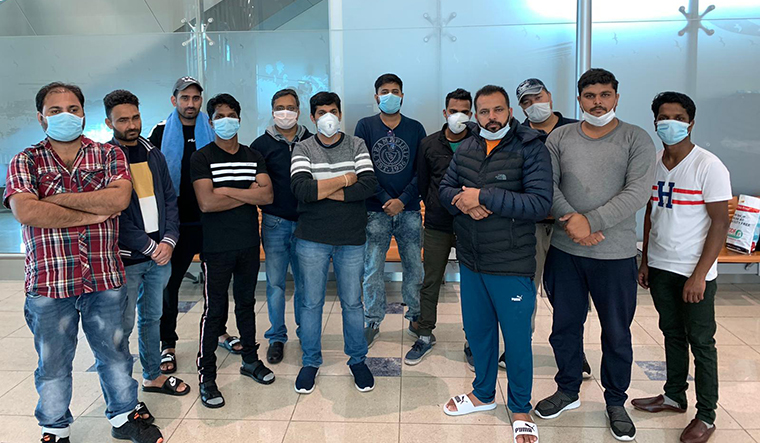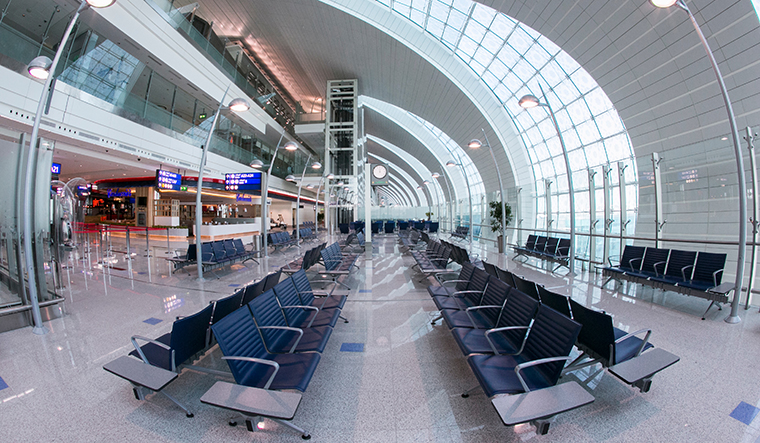It was his 36th day of being stranded in the Dubai International Airport and Deepak Gupta, understandably, was miserable. “I have not seen the sun or breathed fresh air for more than a month,” he told THE WEEK. “I am stuck. Can you imagine such a life?”
Gupta landed in Dubai on March 18, the day India decided to stop the entry of Indians coming from Europe. He was told that he could not fly to India when he was preparing to check in. “I am yet to overcome that shock,” said Gupta, who has been living in the airport since.
A resident of Delhi’s Uttam Nagar, he had gone to Budapest on an official assignment a month earlier. As Covid-19 began to spread worldwide, his employer, a Gurugram-based multinational company, called him back. As he left Budapest to catch an Emirates flight from Dubai to Delhi, little did he know that he would spend the next few weeks in an airport.
“I had no idea about the ban on passengers coming from Europe when I boarded the flight from Budapest,” said Gupta. “My wife is pregnant, and I was counting the hours before I could be with her. Now I really don’t know when I will be able to see her.”
Apart from Gupta, 18 other Indians have been stranded in the airport. They had all landed in Dubai on or after March 18, from different parts of the globe. According to India’s ministry of external affairs, five of them are from Kerala, four from Gujarat, three from Punjab, two from Maharashtra and one each from Delhi, Goa, Himachal Pradesh, Rajasthan and Karnataka.
Most of them had no clue about the ban when they started their journeys. After banning inbound passengers from Europe, India extended the ban to include all international flights on March 22.
“I had no idea about the complete ban until I reached the airport here on March 22,” said Iqbal Hussein of Gujarat, who was on his way home from Tanzania. Ankit Parekh, also of Gujarat, said he had boarded the same flight from Tanzania along with two other Indians and Parekh was planning to catch the March 22 flight to Ahmedabad.
The stranded Indians had a tough time initially as they had to spend their days and nights at the T3 terminal reserved for Emirates flights. “We slept on chairs and on the floor, and survived on food coupons provided by the Indian embassy,” said Benson Andrews of Kerala, who flew in from Lisbon. He and his twin brother, Jackson Andrews, have been in the airport since March 18.
The stranded Indians spent nearly a week at T3, taking bath in airport washrooms and living like Tom Hanks’s character in the 2004 hit The Terminal. The embassy twice gave them 400 dirhams each, but as eateries had started shutting down by then, they had to survive on bun and patties mostly.
Fortunately, Emirates shifted all passengers to the Dubai International Airport Hotel in the terminal after screening them for Covid-19 on March 25. All of them tested negative.
Part of the group is a Bengali couple, who are in their seventies. They had flown in from Sydney to catch a flight to Ahmedabad. “We feel so bad for them,” said a passenger. “They look so lonely and shattered in this unfamiliar situation. The Indian government should have arranged for their journey at least.”
All passengers have been given separate rooms, free food and wireless internet. But, amid the hotel’s luxurious setting, their helplessness is palpable. Most of them spend their time sleeping or watching television. Some hold office meetings online, some wander the corridors, some work out in their rooms. Some have grown very close to each other, sharing their rooms to “shoo away loneliness and depressing thoughts”.
As the days pass, the pining for home is only growing stronger. “Everything has been provided to us,” said Hussein. “But we just want to go home. Please help.”
Gupta said their families back home were worried. “We were all rushing back, as we wanted to be with our families in this difficult time,” he said. “But we are stuck. Please help us get out of here.”
Most passengers feel that the Indian government had left them high and dry. “Are we not Indians?” asked Pizarro Andrade of Goa. “Don’t we belong to India? Why is the government treating us like this?”
Andrade works in a luxury cruise in Sydney. He was planning to catch a flight to India on March 21, but his flight from Sydney to Dubai was delayed because of rain. “Many countries, including Pakistan, took their citizens back on chartered flights,” he said. “Only we Indians and a few others are stuck here. We all have tested negative. Still we are treated like pariahs.”
Andrade’s wife, Marushka, is a receptionist at a counselling centre in Goa. “He always tells me that everything is all right,” she said. “That is what every man would tell his wife, no? I am so worried about him.”
Marushka said the government should have arranged a special flight for the group stranded in Dubai. “They are stuck there for no fault of theirs. Most of them knew about the travel ban only after reaching Dubai. The Indian government should show some mercy.”
The authorities, however, say other countries, including Pakistan, could take their citizens back as they had not announced lockdowns at that time. “It is clearly not possible to carry passengers during the lockdown as there are no flights between the UAE and India,” Consul General Vipul told THE WEEK.
Apart from the 19 Indians, 46 people from countries like Angola, Cameroon, Azerbaijan and Tajikistan are stranded in the Dubai airport. While some Indians are not happy with the Indian government, all heap praise on Emirates. Apparently the airline even provided them Indian food when they asked for it.
Among the stranded passengers is one man who missed his flight to Ahmedabad in the wee hours of March 22. Since he worked in Dubai, the ban on passengers from Europe was not applicable to him. But because he overslept, he ended up missing the flight. He is very upset, understandably.
Over the days that THE WEEK contacted the stranded passengers, their emotional turmoil was quite palpable. Some refused to communicate as they “were too depressed to talk”; a few others were furious. Some who had initially responded positively became increasingly dejected. “Nothing is going to save us,” said one passenger before going offline.
Dr T.S. Jaisoorya, additional professor at the National Institute of Mental Health and Neuro Sciences, Bengaluru, said the mood swings of the stranded passengers were natural. “They are going through a very difficult and uncertain phase—and that, too, in an unfamiliar, artificial situation. They will recover once they reach their homes,” he said.
But what has come as a fresh jolt to the group is the news that India may not lift its ban on international flights even if it decides to end the lockdown on May 3. Some have gone into severe depression following rumours that the ban could remain in place till July.
Pavan Kapoor, India’s ambassador to the UAE, however, said the ban was unlikely to be extended. “We certainly hope that it will not be the case,” he told THE WEEK. “We have kept New Delhi informed about the need for many people from the UAE to return to India for urgent reasons. I am sure that, at the first available opportunity, this will be permitted.”
Interestingly, there are some who look at the prevailing problems positively. “One would stop feeling so bad if one thinks about the thousands who are stranded in different parts of the world without proper shelter, food and water,” said Raju Nair, who runs a restaurant in Moscow. “We should consider ourselves lucky for getting this luxury life in this uncertain time. That is the only way to survive this phase.”
Nair was flying back to his wife and son in Russia from his home state, Kerala. Once the ban is lifted, he plans to return to Kerala as Moscow is unlikely to welcome non-Russian international travellers anytime soon, as Covid-19 cases are going up in Russia.
When THE WEEK contacted Nair, he was in the middle of an intense cardio session. “There is more to life than these stranded days,” he said. “One must emerge stronger after this episode.”
Some have started calling the airport hotel their third home. “I have met some very nice people,” said Karthik Shivaprasad of Bengaluru. “Also, the airport is one of the safest places on earth, as only those who have tested negative are allowed to stay.”
A first-year MBA student at Duke University’s Fuqua School of Business, Karthik was flying back to the US when got stuck in Dubai.
All passengers have been coping with misery in their own ways. At times, they share drinks and watch TV together. Some have even shared their Netflix passwords with others, and many have watched The Terminal more than once, trying to relate to the positive attitude of Hanks’s character. And, many take special care to cheer up the elderly couple from Bengal.
“At times, we pretend to be positive just for the sake of others,” said Andrade. “We all have some interesting stories to tell our children once we reach home.”




